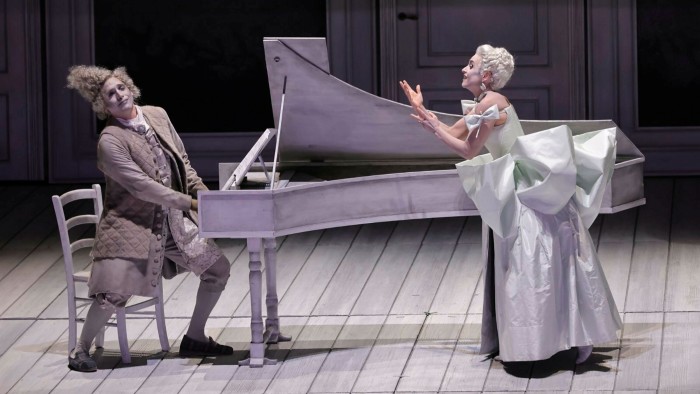Summarize this content to 2000 words in 6 paragraphs in Arabic Unlock the Editor’s Digest for freeRoula Khalaf, Editor of the FT, selects her favourite stories in this weekly newsletter.During an evening performance at La Scala, things are going badly wrong. The dancers’ camp routine is uncoordinated, a soprano singing from atop a flimsy cut-out elephant shrieks as she tumbles, and other precarious scenic elements — suspended by what must be sheer optimism — come crashing down. An impresario is dragged onstage to announce that the theatre has regrettably collapsed. He then makes a quick getaway, leaving the company to soldier on.The anarchic climax comes in a Milan performance of L’opera seria, Bohemian composer Florian Leopold Gassmann’s riotous 1769 opera for Vienna satirising the conventions of the musical genre at the time. The work, while obscure, resurfaces occasionally, with Brussels and Turin mounting it in the past decade. Now La Scala, in a co-production with the Theater an der Wien, has staged it for the first time. It has enlisted French director Laurent Pelly, a master of organised chaos, for the occasion. The plot is simple: Fallito, a bankrupt impresario, mounts a new opera, but rehearsals unravel as librettist and composer bicker and sopranos claw at each other. The near sellout La Scala audience — perhaps lured by its strong recent revivals of rarities such as Cavalli’s La Calisto and Cesti’s L’Orontea — was in stitches by the time the opera-within-an-opera, set in Mughal India, literally fell apart. It is to La Scala’s credit that one of the world’s more formal theatres is willing to laugh at itself.And yet, at the risk of sounding curmudgeonly, this critic found the three-and-a-half-hour performance (intervals included) tiresome. There is only so much unadulterated slapstick one can take.The main issue is the opera itself, with Ranieri de’ Calzabigi’s libretto offering scant depth or interest beyond unending farce and Gassmann’s score — though engaging — lacking memorable set pieces. Pelly’s duochrome production did not help. Lurking stagehands in black observe rehearsals from the shadows, seemingly waiting to depose their employer, and singers wearing white period costumes and zanily coiffed wigs keep things in constant motion as they enter a raked wooden stage via a series of doors. More onstage colour and scenic variety might have broken up the monotony.The performance was buoyed by a well-chosen cast. Pietro Spagnoli was drolly self-serving as the increasingly beleaguered impresario, who eventually abandons the theatre like a captain fleeing a sinking ship. Mattia Olivieri and Giovanni Sala shone as the haughty poet Delirio and the lusty composer Sospiro, and tenor Josh Lovell’s error-prone Ritornello — the opera’s self-absorbed castrato — avoided mishap in testing vocal acrobatics. The trio of rival sopranos — Julie Fuchs’s seething Stonatrilla, Andrea Carroll’s melodramatic Smorfiosa and Serena Gamberoni’s kittenish Porporina — were boldly characterised. Their boastful mothers, headed by countertenor Lawrence Zazzo, provided pantomime horseplay.Conductor Christophe Rousset propelled a spirited rendition of the scuttling score, with baroque outfit Les Talens Lyriques, interspersed with La Scala’s regular players on period instruments, vividly relaying Gassmann’s dizzying harmonic transmogrifications. An evening of easy laughs, but one can’t help but wonder if La Scala — a house currently at the heart of Italy’s belated early opera revival — might have dedicated precious programming space to a more worthwhile masterpiece long overdue its Milan premiere.★★★☆☆To April 9, teatroallascala.org
رائح الآن
rewrite this title in Arabic L’opera seria at La Scala, Milan is a farce where the laughs wear thin — review
مال واعمال
مواضيع رائجة
النشرة البريدية
اشترك للحصول على اخر الأخبار لحظة بلحظة الى بريدك الإلكتروني.
© 2026 جلوب تايم لاين. جميع الحقوق محفوظة.










